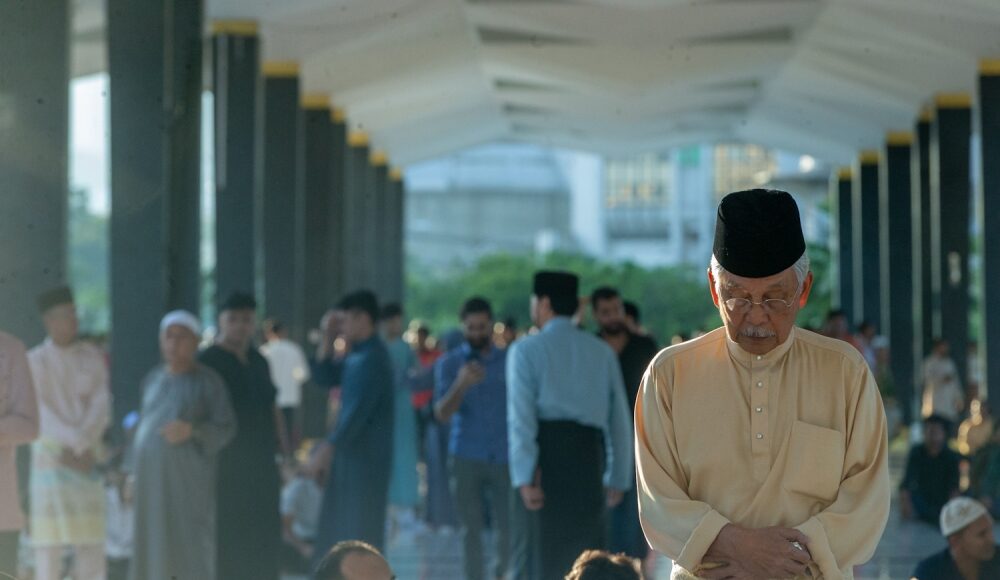APRIL 18 — The month of Syawal marks a significant time for Muslims worldwide as they celebrate Eid al-Fitr. In Malaysia, it is customary for the celebration to extend throughout the entire month, with various festive events being organised to mark the occasion. These typically include traditional gatherings such as open houses, communal feasts, banquets, and other similar activities. These traditions serve as a means of strengthening familial ties, fostering neighbourly relations, and reconnecting with friends. Moreover, they allow hosts to welcome and entertain many guests at one time.
While Syawal is often associated with festivity and joy in marking the end of Ramadan, Muslims are reminded that it also represents a transitional phase from the preceding holy month. In other words, Syawal is a continuation of the worship and virtuous deeds performed during Ramadan. Therefore, the celebration of Eid in Syawal should be grounded in the spirit of faith and piety towards Allah SWT. This principle is supported by evidence found in both the Qur’an and Sunnah. Allah SWT states:
“So that you may complete the prescribed period (of fasting), and that you may glorify Allah for having guided you, and that you may be thankful.”
(Surah al-Baqarah, 2:185)
This verse clearly indicates that upon completing the fast of Ramadan, Muslims are encouraged to exalt the greatness of Allah by proclaiming the takbir. The recitation of takbir is a form of remembrance (dhikr) recommended by the Prophet Muhammad SAW, alongside other forms such as tasbih and tahmid. This verse serves as a scriptural basis for the sunnah of remembering Allah upon completing acts of worship. According to Ibn Kathir, this verse is the foundation for the scholarly consensus (ijma’) on the legitimacy of reciting takbir from the sighting of the Syawal crescent until the Eid prayer the following day. This further underscores that the core essence of Eid celebration lies in remembering and affirming one’s faith in Allah SWT.
Additionally, the Prophet Muhammad SAW spoke about the merits of fasting six days in the month of Syawal. He said:
“Whoever fasts during the month of Ramadan and then follows it with six days of fasting in Syawal, it is as if they have fasted for the entire year.”
(Sahih Muslim)
In Riyadus Salihin by Imam al-Nawawi, this is the only hadith that explicitly highlights the virtues of Syawal. It demonstrates that the key spiritual features of Syawal lie in two aspects: the celebration of Eid al-Fitr on the first day of Syawal and the observance of six additional days of voluntary fasting during the month. In Islamic teaching, Eid al-Fitr is to be celebrated only on the first day of Syawal, as fasting on that day is prohibited. From the following day onward, Muslims are encouraged to resume voluntary acts of worship, such as fasting. This progression from celebration to continued devotion illustrates that the joy of Eid — marking the return to spiritual purity (fitrah) — should be followed by a conscious effort to remember Allah SWT and adhere to the Prophet’s Sunnah.
People perform Aidilfitri prayers at the National Mosque in Kuala Lumpur March 31, 2025. — Picture by Raymond Manuel
Both the Qur’anic verse and the hadith discussed reinforce the view that the Eid celebration in Syawal should be approached through the lens of faith and piety. However, a lack of understanding of Syawal’s deeper meaning has led to Eid celebrations being tainted by distractions, sinful behaviour, and heedlessness. This issue stems from a tendency among some Muslims to perceive Eid solely as a worldly festivity, overlooking its spiritual dimension. In reality, Eid al-Fitr is meant to be an expression of gratitude to Allah for the successful completion of Ramadan, which should then inspire the development of better personal character and religious observance.
From a sociological perspective, the family institution plays a crucial role as an informal educational setting that shapes children’s character with religious and cultural values. Parents who instil Islamic values from an early age are likely to raise individuals with a clear Islamic worldview. This moral and spiritual foundation acts as a strong defence against societal influences that contradict Islamic teachings. Within the context of Eid celebrations, it is important for parents to teach their children Islamic values related to the occasion — such as the importance of seeking forgiveness, visiting relatives, treating guests with kindness, and demonstrating noble character. In an era where access to social media is widespread, children must be equipped with strong moral grounding to resist external influences that conflict with religious and cultural principles.
Moreover, religious education programmes conducted in mosques and prayer halls that address the theme of Eid al-Fitr can enhance public understanding of the occasion. These programmes are particularly impactful when held during the lead-up to Eid, as they align with the period when Muslims are actively preparing for the celebration. In addition to reminders about the virtues of Laylat al-Qadr, these sessions should also include discussions on the Islamic perspective on Eid. Such efforts help correct misconceptions and serve as a reminder to avoid engaging in practices during Eid that contradict Islamic teachings.
In conclusion, understanding the true essence of Eid al-Fitr according to Islamic teachings is essential for developing a clear and meaningful perspective on the celebration. This understanding will help preserve the sanctity of Eid and the month of Syawal from being tarnished by sinful acts and heedless entertainment. With this clarity, Muslims can celebrate Eid al-Fitr with genuine faith, piety, and gratitude towards Allah SWT.
*Muhammad Ammar Harith Idris is a research officer at Pejabat Mufti Wilayah Persekutuan.
**This is the personal opinion of the writer or publication and does not necessarily represent the views of Malay Mail.





